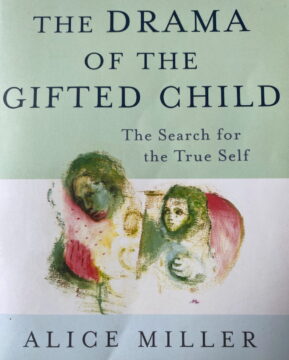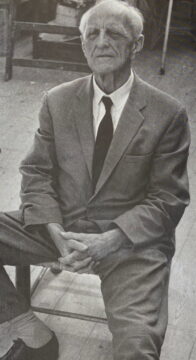by Gary Borjesson
The power and peril of seeing, and being seen, has been with us from the beginning. Almost the first thing Adam and Eve do is seek to hide from being seen by God. (Good luck with that!) Much later, Hegel showed how, in contrast, the desire to be seen—the desire for recognition—is a motive force of human history. Later still, we are learning how critical being seen is to a child’s development.

The negative effects of not being seen are a core theme of Alice Miller’s Drama of the Gifted Child. This book made a deep impression when I first read it years ago, long before I became a psychotherapist. At the risk of triggering those (including myself) with an allergy to therapeutic speak—I felt seen. I wasn’t alone. Since its publication in 1979, the book has sold well over a million copies worldwide.
Miller explores how some children use their “gift” of sensitivity to adapt to inadequate parenting. In particular, she describes how a “false self” develops from the “true self.” This distinction comes from the British pediatrician and psychoanalyst D.W. Winnicott, who observed and thought deeply the relation of parents and children. (Many people besides biological parents can play the role of caregiver; I will use the words “parent” and “mother” to preserve the archetypal resonances.) I expect many readers will recognize aspects of their experience in Winnicott’s influential account of how we can come to feel lost to our true selves.
We all make use of a ‘false’ self. As Winnicott notes, “Each person has a polite or socialized self, and also a personal private self that is not available except for intimacy.” (Home Is Where We Start From: Essays by a Psychoanalyst, Norton & Co, 1990. All quotes are from this book.) Someone gives you a heartfelt gift that you don’t like. But you say you like it because you see there is nothing to be gained by saying how you really feel. The social world depends on having this polite self capable of getting along by masking our true thoughts and feelings.

For Winnicott, the “false self disorder” arises in “those who have unconsciously needed to organize a false-self front to cope with the world, this false front being a defense designed to protect the true self. (The true self has been traumatized and it must never be found and wounded again.)”
I worked with a young man who was a born artist and illustrator. But his parents had other ideas for him, and found his love of art threatening. When I met him he was a few years out of college and struggling with addiction. For much of his life he had complied with his parents, even bowing to their pressure to study biology instead of art. But now he felt lost, neither pursuing medicine (his parents’ dream for him) nor making art. Having lost his early confidence that art was his true calling, he was, in his own words “out of touch” with himself, “unable to tell what is true.” He felt “split,” part of him identified with his parents’ view that pursuing art was a waste of his ability, while another part hated them for discouraging his passion.
Unless it’s strategic—like a “thank-you” we don’t truly mean— hiding out isn’t good for us. After awhile, our true self may be so well hidden that even we can’t find it. More to the point, we have an existential need to be seen; without mirroring and recognition, we suffer. This is especially true in early childhood, when a child’s sense of self is being established.
We can see how inadequate parenting interferes with this process by looking first to what Winnicott thinks “good enough” parents do. He coined this now-ubiquitous phrase to describe parents who are well-enough resourced that they’re able to give their child proper attention. These resources may be external, like having enough money that they can afford to spend time with the child; and internal, like being healthy enough that they don’t project their own needs and anxieties onto the child. Unfortunately, this is what my patient’s parents had done. They hadn’t intended to make him feel ashamed for being who he was. But in cases of false-self disorders, the harm comes from a pattern of not paying attention in a way that helps the child feel seen and loved for who they are. In my patient’s case, the discouragement of his creativity was felt as a more general rejection of who he is.
So, what are good-enough parents doing? We know from research on attachment and interpersonal neurobiology how formative early experience is. And this is precisely where Winnicott starts, looking at the first few months of life. He describes the infant of a good-enough mother having the experience that wherever they ‘look,’ they ‘see’ themselves. In other words, they experience the “other” as an extension of themselves. Winnicott calls this early period “primary maternal preoccupation” because the mother is fully available to meet the their needs. The infant feel seen because whenever they are hungry or tired, the world seamlessly arranges itself to meet their need: the breast appears, the mother provides for comfort and rest. Thus a secure sense of self takes root: I imagine our fortune infant thinking, Whatever else this world may turn out to be, it has started by providing so well for my needs that I hardly know what frustrated need or want feels like.
During the first few months, anyway. For as Winnicott knows, good-enough parents are neither indulgent nor neglectful. Which means that paradise will gradually be lost. As the infant matures, the parents become considerably less preoccupied. They begin returning to their other concerns: their other children, friendships, marriage, work, avocations, and so on. In doing so, they model what they naturally hope to instill in their child: a healthy regard for self and others. As parental preoccupation diminishes, infants starts to notice that the world is not an extension of themselves after all. Others are out there, with sometimes opposing wants and needs. Appallingly, they are even prepared to insist on them! What the good-enough parent knows, of course, is that soon enough the larger world will be sending this same message about others and boundaries, often with much less care! In that case, where better to learn it first than from those who love you most?
Thus good enough parents adapt their behavior to the developing child’s needs. Winnicott calls what they provide a “holding environment”—a safe but not always comfortable place. Consider the toddler who is expected to restrain themselves: Well, it’s frustrating that I’m not to bite or hit others, but it’s not too frustrating. They continue to feel seen and loved, even as they are gradually expected to see and acknowledge the wants and needs of others—like not wanting to be bit, or wanting a “thank-you.” The polite social self is emerging, but it’s not a false self because they are not being pressed into a premature adaptation.
Which brings me back to the “gifted child” who has the sensitivity and awareness precociously to grasp what others (initially their parents) need from them. As with the toddler, this is normal. But when the parenting isn’t good enough—when the parents are under-resourced—such a child over-adapts. In return for being who they imagine others want or need them to be, they hope to feel seen and loved. Alas, it’s their emerging false self that’s being seen and reinforced. The true self goes missing as the child splits off from their own wants and needs in order to comply with others. I’m reminded of an analyst who wrote that he was “made into a clothes horse for all my mother’s illusions.” Similarly, my patient had complied until he didn’t. His addiction forced him (and his parents) to notice the parts of him that were now refusing to live any life but his own.
He knew he mattered to his parents, that they loved him and expected good things for him. Other children, however, develop a false self in response to feeling that they don’t matter. This was the case with a 40-year-old patient. The fourth of five siblings, she had largely been overlooked by her parents. She had spent much of her life trying to shine brightly enough to be seen and admired, and loved. Bright and sensitive, she’d learned very early that she got attention when she performed well, so that’s what she did. (Her mother once told her, “You were such a good baby, you basically toilet-trained yourself.”) Over time she became identified with a false self that was status- and accomplishment-driven. Yet, despite outward success, she struggled with persistent feelings of inadequacy, anxiety, loneliness, and depression. Early in therapy she said, “I have been so busy trying to please and impress others that I have no idea what I really want. I don’t even know where to start to find out.”
As I first learned from Miller, and later from my own therapy, we can find the true self. Whether through over-involvement or neglect, through making a child into a “clothes horse” for parental illusions or overlooking them entirely, the core dynamic is similar: the child’s true self goes into hiding, while the false self adapts to make the best of it. And so the gift of sensitivity becomes both blessing and curse–allowing some children to adapt brilliantly to their parents’ needs while losing touch with their own. But there’s hope. The same sensitivity that once enabled hiding can help us re-discover our true self. The journey back, as Winnicott and Miller emphasized, begins with recognizing how and why we learned to hide in the first place.
***
Enjoying the content on 3QD? Help keep us going by donating now.
